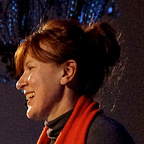The Roast in the Fridge
What I learned from my mother and hers
“Don’t scream. Don’t make any noise, lady, and you won’t get hurt.”
I had been asleep in bed next to my mother with Sasha, the Persian cat we jokingly referred to as our “watch cat”, curled up at the foot.
I was 3 years old.
That night, a strange man came in through the bedroom window of our Los Angeles ranch house and placed his hand (described later to police as “heavily calloused”) over my unconscious mother’s mouth.
Until a year earlier, our house had been just one of dozens tucked along meandering magnolia-lined suburban streets—each with its thirsty patch of lawn, bit of concrete drive, and private backyard—a neighborhood.
But, by that night the neighbors were gone. Our house sat alone, just a box exposed on all sides. From the edges of our property, bare dirt and oatgrass stretched out towards freeways buzzing in the distance, here and there an upstart yucca or mulberry tree that hadn’t yet been bulldozed.
Eminent domain is the power of the government to appropriate private property for public use. The state can also delegate this power to certain private and public entities. Our house was directly below the landing path of an increasing number of planes bound for the increasingly important Los Angeles International Airport. Every year brought more jets and more noise complaints from the local residents. (To an infancy sung to sleep by those engines I owe my involuntary ability to block all ambient sound when I am focused on a thought or task.)
Under eminent domain, the owner must be compensated for the “fair market value” of the property being seized. My grandmother owned our house, she received an offer she found insufficiently fair, and she was five-foot-three of fight. They told her to just give up and move to an affordable condo, and she told them her granddaughter was most certainly going to grow up in a house with a yard to play in. So we stayed and we fought, mostly just by staying—until we were the last house standing. And progress had made us a target for prowlers.
That night, my mother woke up with a strange man’s hand over her mouth. I woke up beside her. And the cat, being far more decorative than useful, bolted under the bed. There is no such thing as a watch cat.
“Now tell me where you keep your valuables,” he said. Or something to that effect. I doubt he actually talked like an insurance adjuster.
When the man removed his hand, standing there in the shadows, my mother answered him. And this I remember as clearly as she enunciated it.
“I am a single working mother. I don’t have any valuables. I don’t have any money. My jewelry is all costume jewelry. Our silverware is made of stainless steel and that’s in a cabinet in the hall.
If you’re hungry, there’s a roast in the fridge.”
It was as if the intruder were a door-to-door salesman, and while my mother was very clearly not interested in what he was selling, she wasn’t going to be inhospitable about it.
This was not the reaction he’d anticipated.
There wasn’t much more to say. After a pause, the guy cleared out of our bedroom, went to check out the rest of the house and took off. I don’t think he bothered with the roast.
That moment has stayed with me my whole life—that cool, controlled response to a threat, the absolute refusal to play the victim. In both my grandmother’s stand against city hall and my mother’s calm dispatch of a home invader, I witnessed the assertion of one’s basic right to live life without being fucked with. And I saw the power of that assertion.
Neither my grandmother nor my mother would have ever described themselves as feminists. Far from it.
But I sure do.
Well into the 21st century, billions of women and girls are still denied the ability to simply live their lives, control their bodies, and pursue their personal ambitions. All too often—that is to say way more than never—blameless life choices result in a death sentence. Even in our affluent “innovative” disembodied internet culture, outspoken women are viciously mocked and threatened in an attempt to silence them.
Over the course of my life, I have felt free to study what I choose, wear what I choose, and do the work that I choose. My reproductive rights have never been in question. I’ve never had trouble for speaking my mind. Thanks to my mother and grandmother, I grew up assuming that asserting my rights was the right thing to do.
This makes me an exception among women. I hate that I am an exception. I hate this more than anything.
So, on this day of honoring the women who came before us, and raised us, and protected us, let’s recognize our responsibility to each other and to all women—not to protect women, but to create a world in which every one can expect basic human rights and respect. It’s on each of us to smack down every hand that comes to silence, to harm, or to deny opportunities.
And if you get hungry, there’s a roast in the fridge.
